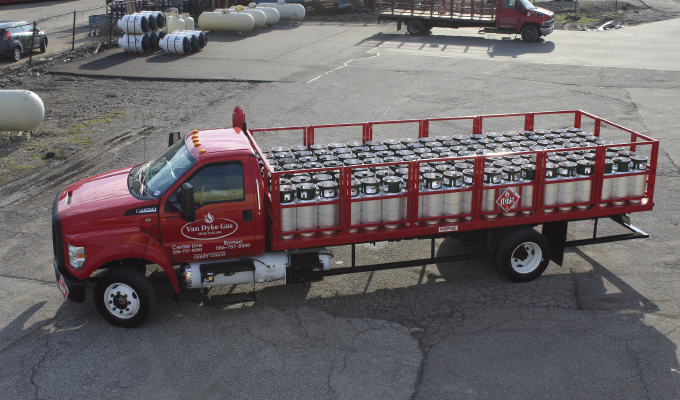Michigan-based fuel distributor has used propane vehicles as a key part of its fleet since 1984. Van Dyke Gas believed it made good financial sense to use propane fuel systems due to the easy access to the fuel and the cost savings it brought to the business. Besides propane, the company also distributes gasoline and diesel fuel.
“For us, and most others, cost savings have always been the driving factor in operating our fleet on propane,” says Andrew Reinhardt, general manager, Van Dyke Gas.
Currently, Van Dyke Gas’s fleet includes 12 propane-powered vehicles and 13 that run on other fuels. Their propane vehicles, including Ford F-650 and F-750 units, handle critical tasks like deliveries and crane operations, clocking about 100,000 miles annually. Over the years, the company estimates its propane vehicles have collectively driven three million miles.
CLEAN, COST SAVING BENEFITS
Hundreds of commercial and government fleets nationwide have reported fuel and maintenance cost savings with propane autogas. On average, propane autogas costs 40 percent less than gasoline and 50 percent less than diesel. Propane’s clean operation reduces vehicle maintenance service.
In addition to cost reductions, operating propane vehicles has supported Van Dyke Gas’s environmental commitment, as propane autogas engine technology has advanced to the point where emissions are reduced to near zero. The company’s propane vehicles are certified to the ultra-low NOx level of 0.02 grams per brake horsepower-hour, making them 90 percent cleaner than the EPA’s most stringent heavy-duty engine standard. They also emit fewer greenhouse gases, smog-producing hydrocarbons, and particulate emissions than conventional fuels.
“Our company, like many others, has made a climate pledge and is committed to net zero emissions. Propane gets overlooked in achieving that goal,” says Reinhardt.
Over 90 percent of the United States’ propane autogas supply is produced domestically, enhancing energy security, and creating jobs throughout the supply chain.
“If our goal is to combat climate change and minimize impact to our business operations to achieve these goals; it only makes sense to consider a fuel that checks all those boxes in addition to keeping and creating jobs in America,” says Reinhardt.
The company’s maintenance crews and drivers have embraced propane vehicles, finding them reliable and efficient, especially with the adoption of advanced propane technology nearly 10 years ago.
“Our drivers have no complaints on the vehicle performance, and we have had no issues operating vehicles with GVWRs of 24,000 and more,” says Reinhardt.
PROPANE FUELING INFRASTRUCTURE
Besides supplying its own fleet with propane, Van Dyke Gas also services other fleets, including street sweepers, school districts and various businesses. Van Dyke Gas sells the fuel at $0.90 less per gallon than gasoline or diesel.
“We have created agreements to provide the dispensing equipment and propane tank at no cost to them provided they sign a service contract,” says Reinhardt.
The company has customers who come to them directly for vehicle fill-ups, as well as those who have fuel dispensers installed at their locations. Van Dyke Gas has different dispensing equipment options that vary in price and functionality to meet customer needs. Once trained, Reinhardt said that fueling propane into a vehicle tank is a straightforward and safe process, with dispensers designed very similarly to traditional gas pumps.
Having on-site propane fueling stations has been a significant advantage for Van Dyke Gas as well. The company has boosted employee productivity by eliminating the need for long stops at public fuel stations.
“When a fueling station is installed onsite, there is no longer a need for company credit cards or fuel cards, and extended stops at gas stations are removed,” he said.
For other fleets considering the shift to propane, Reinhardt recommends weighing all the benefits, including cost reductions, lower emissions, and consistent vehicle performance. Using different initiatives and incentives, such as state propane gas association rebates and the alternative fuel tax credit, can make the transition even more appealing.
“I would advise anyone looking at making a change to their fleet’s fuel to include propane in their analysis. If your company’s goals are to reduce fuel costs, reduce emissions and avoid downtimes from charging, while maintaining the same vehicle power and performance your drivers are accustomed to—propane should be at the top of your list,” says Reinhardt.
About the Author
Todd Mouw is executive vice president for ROUSH CleanTech. Currently a Board member of the NTEA, Mouw has served as president of the NTEA Green Truck Association. To learn more, visit www.roushcleantech.com.




